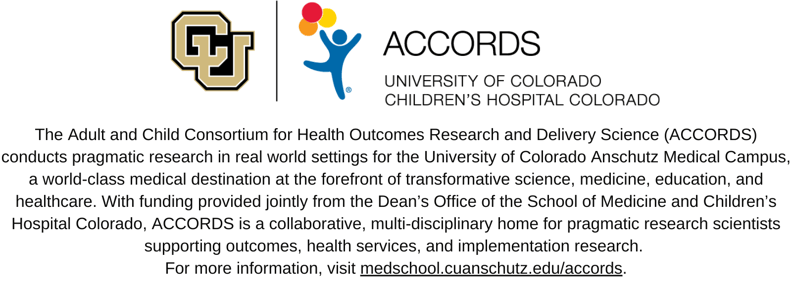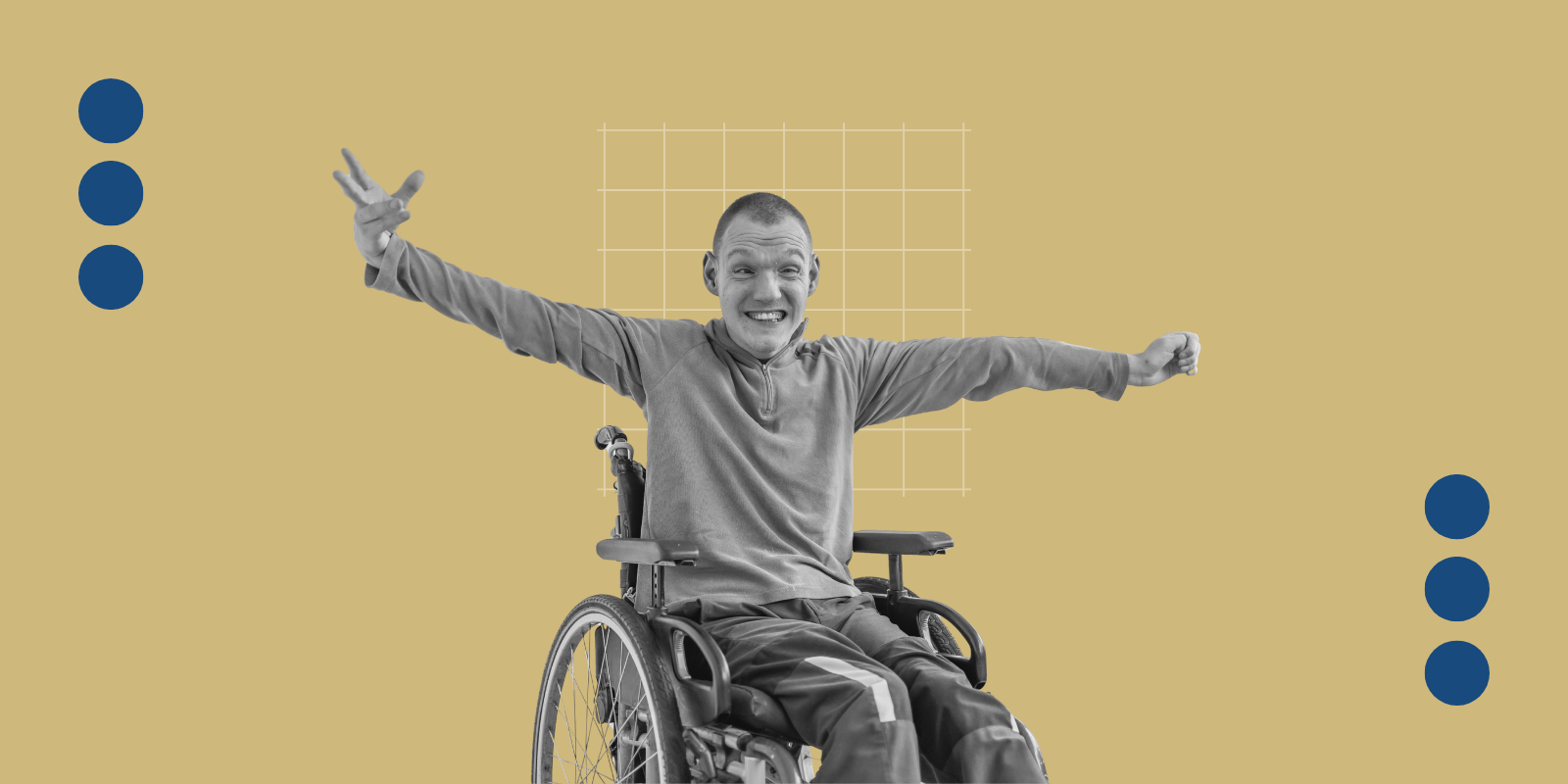We are more likely to trust a familiar voice.
The New York Times published a dialect quiz that, by offering users a series of multiple-choice options of everyday life phrases and names, could pinpoint the exact U.S. region a quiz taker was from. Each of us comes from a community with its own dialect—how we talk is unique to not just our state, but our region, county, city, and even neighborhood.
When someone can speak to the specific needs and struggles in your community and use the same words, accent, metaphors, or examples that you use, there is a foundation of trust already present in that conversation. We are more likely to trust a familiar voice.
Researchers from the Adult and Child Consortium for Health Outcomes Research and Delivery Science (ACCORDS) at the University of Colorado and Children's Hospital Colorado are using unique methods like Boot Camp Translation (BCT) and PhotoVoice to harness that 'familiar voice' to positively impact Colorado communities with low COVID-19 vaccine rates
Boot Camp Translation
Initially created to increase colorectal cancer screenings, community partners and researchers from the University of Colorado (CU) Department of Family Medicine developed the BCT framework. BCT partners local community members, researchers, medical experts, and communications professionals to create public health messaging and collateral. This method educates individuals from any given community on a public health topic to collectively develop locally relevant messages and materials that speak to, and hopefully encourage, their friends, family, and other members of the community to change behaviors on that topic. Group members serve as trustworthy, familiar voices.
“The Boot Camp [Translation] process gives community members a process for taking medical jargon and information from the scientific world and making it understandable and relevant for the rest of the community,” says Dr. Sarah Brewer, Investigator at ACCORDS and Assistant Professor at the CU Department of Family Medicine.
Mary Fisher, project manager for the ACCORDS Community Engagement and Outreach program and Colorado Clinical and Translational Sciences Institute (CCTSI), and other members of the research teams like to refer to BCT participants as ‘free-range humans.’ “They are typically local business owners, teachers, farmers or ranchers, essential workers, and people who just live and work in the community,” says Fisher. “We want our BCT groups to reflect the community as much as possible. They may or may not have any medical knowledge, so we go through a process to help them gain that knowledge.”
After BCT cohort community members have a base knowledge of the science and purpose of the BCT, cohorts begin what is typically an 8-10 month process creating messaging and communication strategies. This communication is created by and for the community and may come in the form of radio advertisements, mailers, hats, t-shirts, posters to put up in the local church or community center, stickers for local business doors, etc.
“The process we use is very community-specific,” says Fisher. “The messages and materials created are very appropriate for the community. They include photos and images that make sense to the community, accompanied by messages with slang or jargon that's [locally] appropriate… and culturally relevant.”
Diverse community voices to address hesitancy
Dr. Donald Nease Jr., Director of the ACCORDS Practice-Based Research Network (PBRN) Core, along with the Community Engagement and Outreach Program, is one of three principal investigators on the Colorado Community Engagement Alliance (CEAL) Against COVID-19 Disparities team, a national project supported by the National Institutes of Health. Drs. Nease and Brewer, along with Ms. Fisher, are leading one of two ACCORDS research teams using a rapid BCT process.
Rapid BCT or rBCT, is an innovation developed by Dr. Brewer to address the need for a more rapid response to vaccine disparities as the COVID-19 pandemic evolves. With the delta variant surging, researchers cannot wait for 8-10 months to create messages to encourage vaccinations. The larger CO-CEAL group is working with five cohorts in communities of vaccine disparity in Colorado: Urban Latino communities in Denver and Pueblo; Rural Latino communities in the San Luis Valley; Urban black African American communities in Denver; Rural Black communities (mainly Somali) northeast Colorado; Urban American Indian and Alaska Native communities in Denver.
"The approach is to build community
immunity out of trust for each other."
- Dr. Sarah Brewer
“The hope is that we are not just ordering people to go and get vaccinated,” says Brewer. “Through the BCT process, trusted people in their community will hopefully start conversations with them about [COVID vaccinations]. The approach is to build community immunity out of trust for each other. If we can start the conversations through Boot Camp [Translation] cohort members and other community leaders, they can guide people to more information. Our partners don’t need to be experts, just the ones that others trust and point them to information they can trust.”
COVID-19 vaccination hesitancy
Another ACCORDS research group, led by principal investigator Dr. Sean O’Leary, Investigator at ACCORDS and Professor of Pediatrics at CU, is building upon its previous BCT cohorts to address COVID-19 vaccine hesitancy. The team has previously worked with rural adolescents on increasing HPV vaccinations in communities across the Western Slope. Funded by the Colorado Department of Public Health and Environment (CDPHE) and the Centers for Disease Control and Prevention (CDC), O’Leary’s group is about to begin an 8-week rBCT project to increase COVID-19 vaccinations across Archuleta, Chaffee, Delta, Fremont, Grand, La Plata, and Montrose counties. Both ACCORDS groups will be expediting the BCT process to keep up with the growing need for increased vaccinations.
“For this project, we’ve brought Dr. Laura Scherer from ACCORDS, as a behavioral scientist, to join our cohorts,” says O’Leary. “We’re starting the messaging at the community level, but she's also going to help craft those messages using behavioral science.”
Using teen voices and images to encourage adult vaccination
Also funded by CDPHE, Dr. Allison Kempe, ACCORDS Director and Professor of Pediatrics at the CU School of Medicine and the Colorado School of Public Health, and her team are also working on a different research project to bolster vaccines in the state. Kempe’s group, which includes Drs. Megan Morris, Brooke Dorsey Holliman, Andrea Jimenez-Zambrano, and Scherer, will use the PhotoVoicing method for their outreach.
Since 1997, PhotoVoice has been used to engage hundreds of communities and individuals who might have hesitancy with engaging in community activism, such as persons of color, persons with disabilities, and youth. Based on vaccine data from CDPHE, Kempe’s team will work with community leaders to recruit three cohorts of youth, ages 12-18 years old: white youth from rural areas, Black youth, and those for whom Spanish is the primary language spoken in their home. Each cohort will use their photos and voices to encourage older adults to get vaccinated.
“One thing I value about this methodology is it’s rooted in developing strategies for change,” says Dorsey Holliman. “Through photo images, our goal is to address COVID-19 vaccine hesitancy in targeted communities and move beyond the literal of ‘What do you see in this photograph?’ to ‘What can we do to address COVID-19 vaccine hesitancy in your community?’”
Each participant will be given an inexpensive digital camera and assigned one of three prompts. Potential prompts include:
-
-
- How has COVID-19 affected you, your friends, your family, and your community?
- If COVID-19 went away, how would your life, as well as the lives of your friends, family, and community change?
- Why do you think some people in your community are hesitant or concerned about getting the COVID-19 vaccine? What are ways to encourage people in your community to get the vaccine?
-
For each prompt, participants will be asked to take pictures for one month and then participate in a two-hour focus group to share their photos and describe why they chose their subjects and what the pictures mean to them. The messages will focus on the students’ experiences with COVID-19, their perceptions of how COVID-19 has affected their community, and what it would mean if their community was fully vaccinated. These photos and messages will be disseminated in a variety of visual methods including short videos and social media posts.
"The power of the ACCORDS program
is that it brings together experts
across so many disciplines."
- Dr. Allison Kempe
“The power of the ACCORDS program is that it brings together experts across so many disciplines,” continues Kempe. “On this project, I serve as the immunization expert; Dr. Laura Scherer is a social scientist who focuses on health messaging and disseminating evidence-based messages in health; and Drs. Dorsey Holliman and Jimenez-Zambrano are qualitative methodologists. We have expertise in so many areas that equip us to do this type of project well.”
Each of these research groups from ACCORDS will perform evaluations on their approach, using these studies to further the fields of dissemination and implementation, immunization, and community engagement research. The practice of relying on familiar trusted voices to influence communities has uses beyond just increasing COVID vaccinations. These methods of outreach can apply to innumerable public health issues our communities will face. While the circumstances under which these ACCORDS groups have been asked or inspired to perform this research are dire, the outcomes will continue to serve communities in the future.




